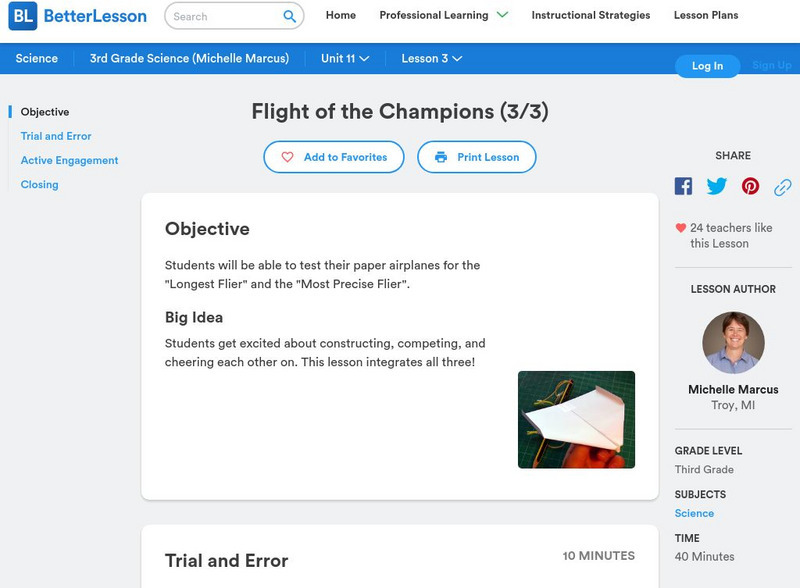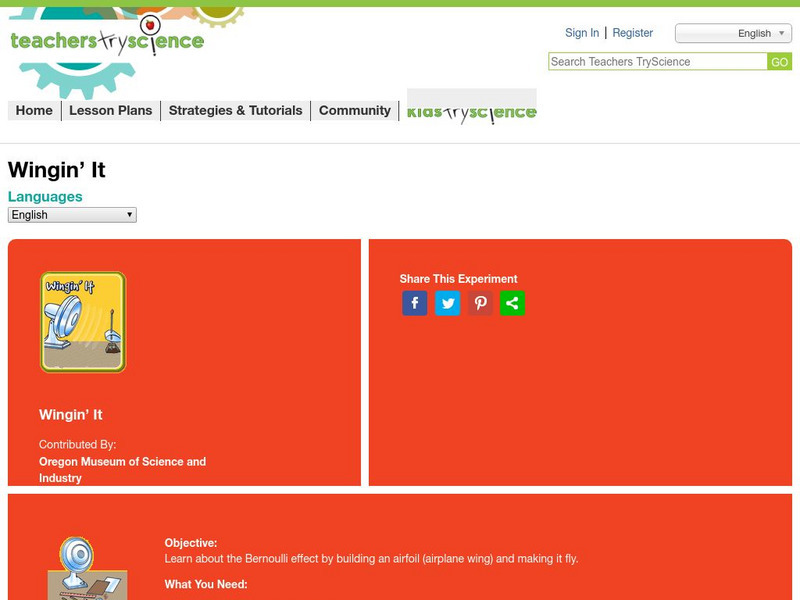TeachEngineering
Teach Engineering: May the Force Be With You: Drag
This lesson plan explores the drag force on airplanes. The students will be introduced to the concept of conservation of energy and how it relates to drag. Students will explore the relationship between drag and the shape, speed and size...
TeachEngineering
Teach Engineering: Will It Fly?
In this lesson plan, students will learn about kites and gliders and how these models can help in understanding the concept of flight. Students will design and build their own balsa wood models and experiment with different control...
TeachEngineering
Teach Engineering: What Makes Airplanes Fly?
Learners begin to explore the idea of a force. To further their understanding of drag, gravity and weight, they conduct activities that model the behavior of parachutes and helicopters. An associated literacy activity engages the class...
CK-12 Foundation
Ck 12: Biology: Bird Structure and Function
[Free Registration/Login may be required to access all resource tools.] An overview of flight structures in birds.
Scholastic
Scholastic Instructor: 100 Years of Flight
Learn more about the first "100 Years of Flight" when you explore this article. It features resources, historical background knowledge and more.
Library of Congress
Loc: Wilbur and Orville Wright Papers
Over 49,000 digitized primary documents having to do with the Wright brothers and their work with flight. A timeline of the brothers' work, a family tree, and other special presentations are offered.
PBS
Pbs Teachers: Supersonic Dream: Anatomy of Concorde
Examine the features of Concorde that were designed and engineered for high-altitude, supersonic flight by exploring this detailed, interactive cross section.
NASA
Nasa: Weight and Balance Forces Acting on an Airplane
The effects of forces exerted on an airplane wing are discussed both conceptually and mathematically. Illustrations and sample problems and solutions are provided.
Other
E Gfi: Lesson: Get a Lift
In this instructional activity, students are introduced to the four forces of flight-drag, lift, thrust, and weight-through a variety of fun-filled flight experiments. Students will "fly" for short periods and then evaluate factors that...
Maryland Science Center
Maryland Science Center: Barnyard Ballooning [Pdf]
This is a design challenge where students create a basket, attach it to a balloon, add eggs, and drop it all from a height to see if their design protects the eggs from cracking.
CK-12 Foundation
Ck 12 Exploration Series: Simulations: What Makes an Airplane Stall?
[Free Registration/Login Required] Learn about the science behind flying an airplane and play this simulation game to see the effects of wing profile, thrust, angle of attack, and airplane size.
TED Talks
Ted: Ted Ed: Turbulence: One of the Great Unsolved Mysteries of Physics
Tomas Chor dives into one of the prevailing mysteries of physics: the complex phenomenon of turbulence.
Better Lesson
Better Lesson: Flight of the Champions (3/3)
Third graders get excited about constructing, competing, and cheering each other on. This instructional activity integrates all three!
The Franklin Institute
Franklin Institute: The Case Files: History of Transportation Technologies
A history of transportation technologies, and the individuals who led the way in developing and advancing new modes of transportation.
NASA
Nasa: Flight: Parts of an Airplane
Find out about the parts of the airplane, including a description and purpose of each and a look at how pilots maneuver parts in order to climb, dive, and turn.
Teachers TryScience
Teachers Try Science: Wingin' It
Learn about the Bernoulli effect by building an airplane wing, or airfoil, and making it fly.
Library of Congress
Loc: America's Story: Charles Lindbergh, Flying Cross
The accomplishments of Charles Lindbergh and Amelia Earhart may not seem like much by today's standards, but for their time, they were quite the heroes! This site documents Charles Lindbergh's award of the Flying Cross for his...
University Corporation for Atmospheric Research
Ucar: Learn to Fly! Uav First Flight
Students begin to learn basics of flying UAVs/drones. This simple initial flight includes a take-off, hovering at different heights, and landing.
PBS
Pbs Learning Media: Higher and Faster
For this interactive lesson, students will explore the social factors, economic factors and engineering innovations that drive higher and faster commercial flights.
MadSci Network
Mad Scientist Network: How Do Planes Fly Upside Down?
Question and answer regarding the physics principles that apply to a plane flying upside down.
National Academy of Engineering
Greatest Achievements: Airplane
This page provides an overview of the history behind one of the greatest engineering innovations of all time:the airplane. There is also a timeline showing its development.
University of Wisconsin
The Why Files: Mosquito Bytes
A general description of the life cycle of the mosquito. Includes inforation on why they need blood and how they breed.
Michigan Reach Out
Nasa Trc: Flying Wing
In this lesson plan students can make a flying wing and trouble-shoot until the wing glides smoothly.
Michigan Reach Out
Reach Out!: Making Paper Airplane Gliders
Students learn the fundamentals of aerodynamics in this hands-on exercise.


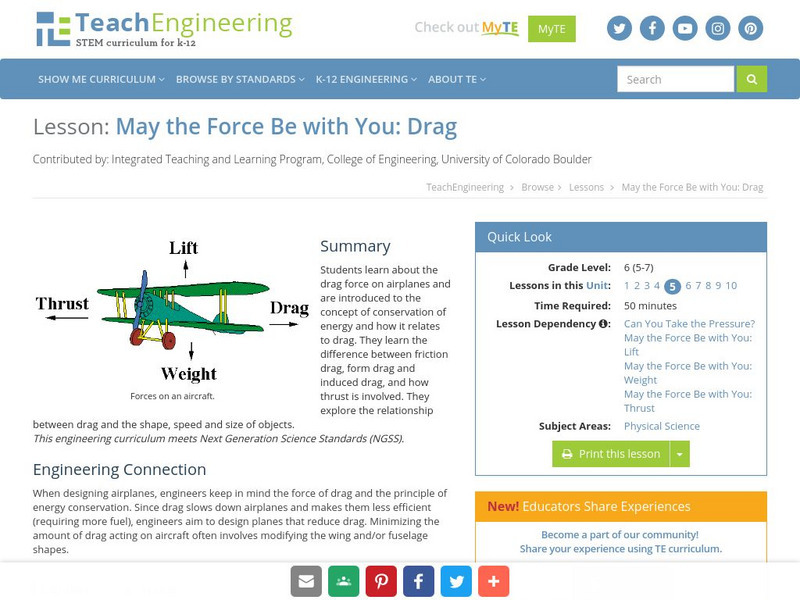



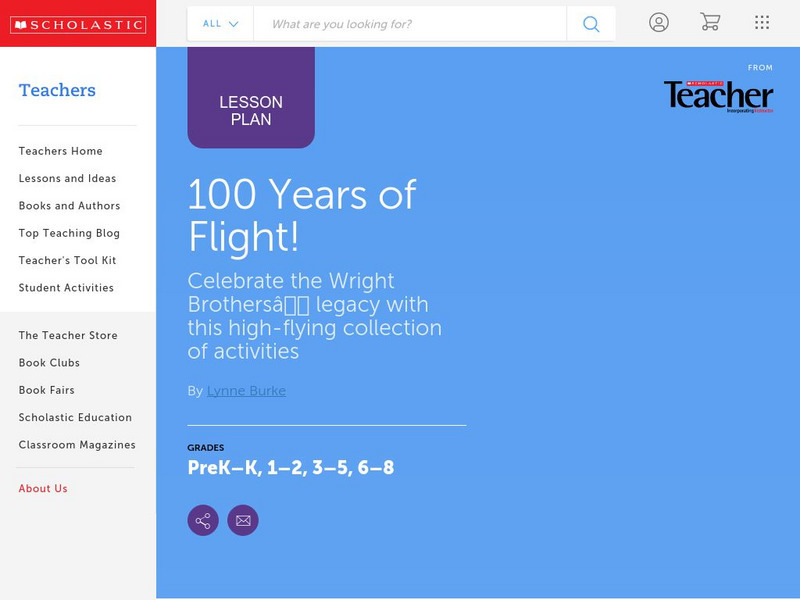



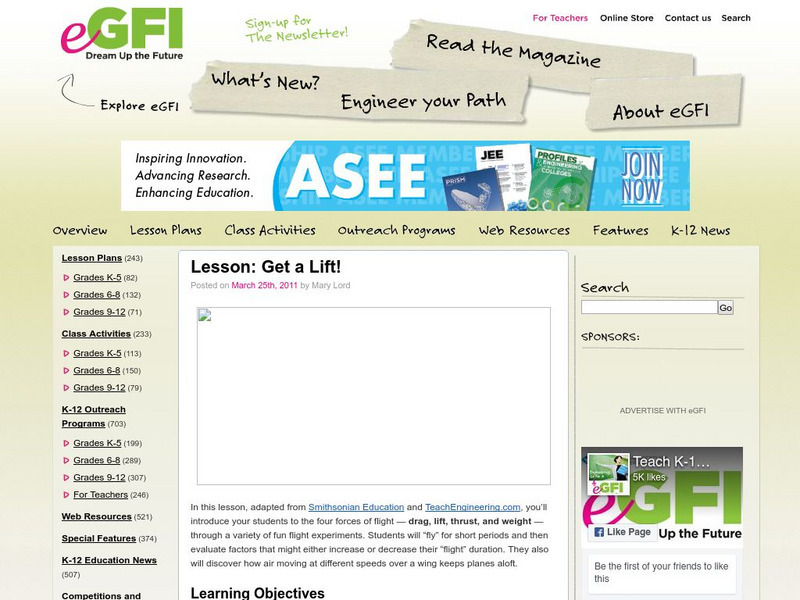
![Maryland Science Center: Barnyard Ballooning [Pdf] Activity Maryland Science Center: Barnyard Ballooning [Pdf] Activity](https://d15y2dacu3jp90.cloudfront.net/images/attachment_defaults/resource/large/FPO-knovation.png)

